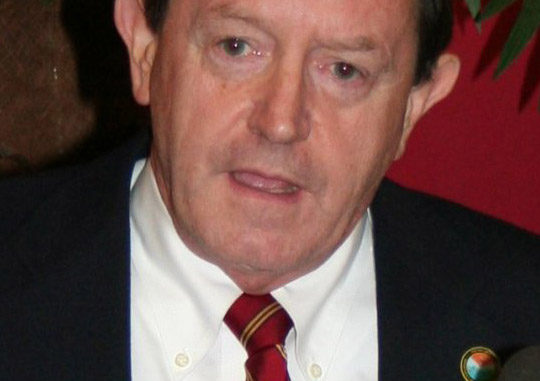
Retirement becomes effective Jan. 15.
John Frampton, a wildlife biologist credited with helping preserve some of South Carolina’s most beautiful natural areas, announced yesterday (Nov. 1) that he will retire from the South Carolina Department of Natural Resources effective Jan. 15.
Frampton has worked for the natural resources agency for more than 37 years, the last 8 1/2 as its director.
“I believe the time for a change for both me and the Department is now,” the 63-yar-old Frampton said in an email announcement to SCDNR employees and members of the Natural Resources Board.
He said he planned to spend more time with his family, especially his grandchildren.
“Unfortunately, as a child, I did not have the opportunity to know either of my grandfathers, as they died before I was old enough to remember them,” Frampton said. “I am going to do my best for that not to happen with my grandchildren.”
His pending retirement leaves a major void in SCDNR leadership that was magnified by the announcement the same day that one of his key deputy directors also plans to retire in early January.
Carole Collins, deputy director of the Outreach and Support Services Division, said she is leaving to become a full-time mom and spend more time with family.
Frampton’s announcement means the DNR Board will have about two months to either name a successor or interim director while conducting a search for a permanent director.
The announcement also sent ripples through the conservation community, which has honored Frampton for his efforts in preservation and protection of critical natural areas across the state.
“People disagree with John from time to time, but his personal integrity and love for South Carolina’s outdoors have never been questioned,” said South Carolina Wildlife Federation Executive Director Ben Gregg, who also oversees the Camo Coalition. “His greatest legacy is the thousands and thousands of acres of land and waters he has personally played a key role in protecting for our children and grandchildren.”
Frampton, along with a representative of Ducks Unlimited and The Nature Conservancy, is credited with initiating the ACE Basin Project that has protected more than 135,000 acres in the estuary created by the flow of the Ashepoo, Combahee and Edisto Rivers.
Frampton continues to serve on the ACE Basin Task Force.
He also is credited with expanding the Focus Area concept throughout the state, and handled the negotiations and purchase of over 180,000 acres of land, including the 44,500-acre protective initiative known as the Jocassee Gorges Project, for the department.
Active in regional, national and international wildlife programs, Frampton is a past president of both the Southeastern Association of Fish and Wildlife Agencies and the Association of Fish and Wildlife Agencies (AFWA). He represents South Carolina on the Management Board of the Atlantic Coast Joint Venture, and serves as the agency representative on the Atlantic Flyway Council.
He also served as a staff member on the North American Wetlands Conservation Council from 1991 to 1998. Frampton represents the department on the Atlantic States Marine Fisheries Commission and the National Fish Habitat Action Plan Committee, serves on the International North American Waterfowl Management Plan Committee and is a member of the U.S. Fish and Wildlife Service Joint Federal Aid Policy Task Force.
For all of his successes in wildlife, however, he said he was most disappointed in not being able to find funding to increase agency salaries and preserve needed programs. In his eight-plus years at the helm of SCDNR, he has seen agency revenues plummet due to the bad economy.
In the past four years alone, the state-appropriated budget for the agency dropped from $32 million to $14 million, prompting cuts in staff and programs. Some counties now have no resident wildlife officers, as the enforcement division was forced to consolidate and reduce enforcement efforts.
Frampton’s frustration with the political process boiled over recently when he labeled some state lawmakers who refuse to acknowledge the importance of maintaining the state’s natural resources as “jackasses.”
A native of Summerville, Frampton earned a degree in marine biology from the College of Charleston, a masters in biology from The Citadel and an masters in wildlife biologist from Clemson University.
He joined the SCDNR in 1974 as an assistant wildlife biologist in the Central Piedmont Hunt Unit, was named regional wildlife biologist two years later and was promoted to chief of wildlife in 1985.
He was named assistant director of the agency in 1999 and succeeded Paul Sandifer as director in 2003.



Be the first to comment